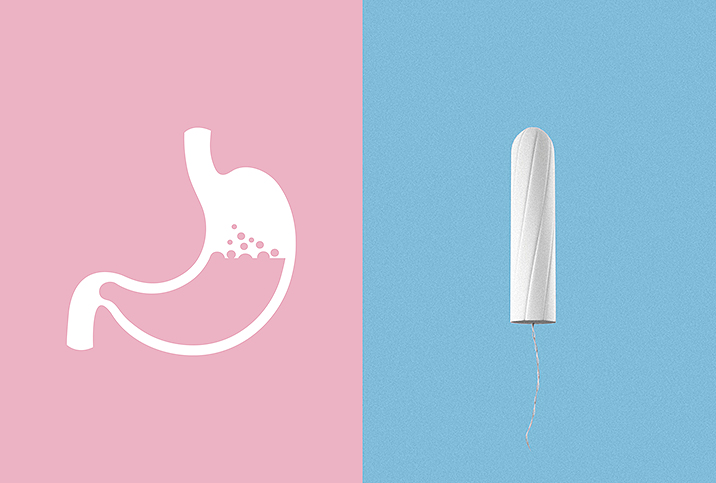Not All Menstrual Cycles Are Created Equal

All of us are different—our lifestyles, diets, living conditions and bodies vary—which means our menstruation experience varies, too. Some people experience a 21-day cycle, with five days of bleeding. Others have a 29-day cycle with three days of bleeding. Meanwhile, you might fall somewhere in the middle. Is one of these cycles healthier than the others? Is there even such a thing as a "normal" menstrual cycle?
The short answer is, no, there is no "normal" when it comes to the menstrual cycle. Everyone's cycle will vary slightly depending on their unique body and various genetic and lifestyle factors.
But your cycle is an important window into your health, so it's essential to know what's normal for you—and what's not. We talked to experts about how to get to know your cycle better, and the things it can tell you about your health.
The role of ovulation
Ovulation is when the egg is released from the ovary. After ovulation, you enter the luteal phase of your cycle, where the released egg can be fertilized by sperm. Generally, when you're ovulating, you might see clear, thin, slippery discharge with the consistency of egg whites in your underwear.
"In general, what makes a 'normal' period is ovulation," explained Kelly Culwell, M.D., a San Diego-based OB-GYN and nationally renowned women's health expert who goes by Dr. Lady Doctor.
However, just because you get your period does not mean you have ovulated. For instance, if you are on hormonal birth control, ovulation is prevented. The bleeding you experience while on birth control is called withdrawal bleeding and is not a true period. Some women on hormonal birth control choose to skip this bleeding entirely.
Just because you get your period does not mean you have ovulated.
In addition to birth control, which purposely prevents ovulation, other factors and health conditions can also inhibit ovulation. According to the American Pregnancy Association, stress and illness can both have a negative effect on your cycle. Conversely, living a healthy lifestyle is important for a healthy cycle.
In particular, diet and exercise have an impact on ovulation because of their impact on body weight. Women on calorie-restrictive diets and performing excessive exercise can stop ovulating, as can women with anorexia who have lost a lot of weight, Culwell said, adding that obesity can have a similar effect.
"Extremes on either side of the continuum change the way hormones are circulated," she said
If you have been trying to get pregnant without success, it's important to talk to a healthcare professional who can run tests and advise you about whether you are ovulating regularly or not, and the factors that are influencing your cycle.
So, there's no 'normal.' But what about 'average'?
While a normal cycle looks different for everyone, scientists can tell you what an "average" cycle looks like based on research data, which is why you've probably heard at some point that the average cycle is 28 days.
"The 'average' menstrual cycle for an adult not on birth control is between 24 and 28 days, with five to seven days of bleeding," said Kecia Gaither, M.D., a physician double board-certified in OB-GYN and Maternal-Fetal Medicine, and the director of perinatal services at NYC Health + Hospitals/Lincoln in the Bronx.
However, just because this is the average cycle doesn't mean it's consistent with the experiences of many women, a lot of whom might not have a 28-day cycle, according to Culwell. This shouldn't be a cause for concern, though, because the American College of Obstetricians and Gynecologists (ACOG) states that 21 to 35 days is the range of a normal menstrual cycle.
"Cycle length and time can vary from woman to woman, or even within one woman," Gaither added. "This can be predicated by age, weight, stress, thyroid disorders, breastfeeding, PCOS, alcohol consumption [or] genetics."
When to be concerned
If your cycle is a bit shorter or longer than the average, don't panic. "Short cycles are not a big problem," Culwell said. It's common as you age and get closer to menopause to have a shorter cycle.
Menstrual cycles on the other end of the spectrum, however, which are prolonged, are potentially more troublesome.
"What I'm concerned about are the irregular cycles or very, very long cycles," Culwell said.
A long cycle is considered one longer than 35 days.
"In longer cycles, you have to be concerned that the endometrial lining doesn't build up too much," Culwell explained.
During normal ovulation, the follicle matures and progesterone is released. A common cause of longer cycles is the failure of the follicle to mature. This means your body isn't undergoing the necessary process to develop and release progesterone. As a result, estrogen levels won't be balanced and the lining of the uterus will continue to thicken.
"The endometrial lining grows in response to hormones released after ovulation," Culwell said. "If ovulation doesn't happen, then the lining can grow and grow and cause endometrial hyperplasia."
Endometrial hyperplasia is a condition where the lining of the uterus becomes too thick and can cause abnormal bleeding. Culwell stressed this can be very harmful and even lead to endometrial cancer.
A cycle is considered irregular if your period stops for more than 90 days and you are not pregnant; your periods go from being regular to erratic; your bleeding lasts longer than seven days; your bleeding is heavier than normal; you bleed between periods; or you experience severe period pain. Pregnancy, eating disorders, polycystic ovary syndrome (PCOS), premature ovarian failure, pelvic inflammatory disease (PID) and uterine fibroids are all possible causes of irregular cycles.
If you are experiencing a very long or irregular cycle, make sure to schedule a visit to your doctor to rule out any underlying conditions.
Tracking your cycle
The best way to know if your cycle is healthy is to get to know your body better. Culwell recommends tracking your cycle.
"Menstrual tracking is a good first step, keeping track of the days you bleed and the symptoms you have," Culwell explained. "Sometimes we think we're not having a regular period, but sitting down and seeing what's happening with your cycle can be helpful in seeing what's going on."
To start tracking your cycle, begin by noting the start date of your period. Make special notes about the end date of your period, the heaviness of your flow, abnormal bleeding, the type of discharge you experience, any pain or cramping, and other changes in mood or behavior.
When tracking your cycle, it's important to remember your period being a day or two off is normal.
"Overall, the way to find a normal period is to find what's normal for you," Culwell concluded.




















